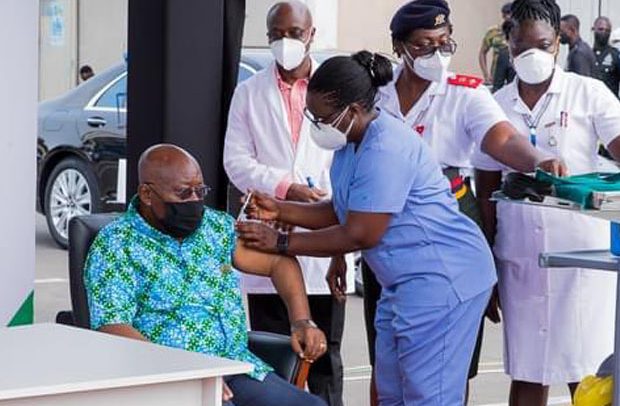President Akufo-Addo being injected with the Covid-19 vaccine
President Akufo-Addo and his wife, Rebecca Akufo-Addo yesterday took their shot of the Covid-19 vaccine at the 37 Military Hospital, Accra ahead of the roll-out of the vaccination campaign today.
Immediately the President’s symbolic exercise which was captured live on television ended, his Vice, Dr. Mahamudu Bawumia, and his wife, Samira Bawumia, also took their turn at the Police Hospital, Accra, a few kilometres from the military facility.
The first couple submitted themselves to the jab which was administered by their official physician, Dr. Petrina Tekyi-Ankrah, after which they were issued their respective vaccination cards.
Following the first couple’s example were the Vice President and his wife who also took their jabs of the vaccine, same administered by Dr. Tekyi-Ankrah, in a separate ceremony and were also issued vaccination cards after going through the process.
The President looked composed and took the jab without a blink, followed by the First lady who at a point appeared to have closed her eyes to take her jab.
As the Covid-19 vaccine rules demand, the President and his wife had to wait for about 10 minutes to be observed by the physicians to ensure everything was in order.
Setting Example
“It is important that I set the example that this vaccine is safe by being the first to have it, so that everybody in Ghana can feel comfortable about taking this vaccine,” President Akufo-Addo said a few minutes before taking his jab.
He stressed the importance of everybody being vaccinated, adding that the introduction of the vaccine “does not mean we are throwing away all other protocols; all the other protocols remain in place until we are satisfied that the virus has finally disappeared from the soil of Ghana.”
The decision by the President and his Vice together with their wives to have a live broadcast of their vaccination was to dispel any negative notion associated with the Covid-19 vaccine.
UNICEF Applauds
After the event, the United Nations International Children’s Emergency Fund, UNICEF, commended President Akufo-Addo for showing leadership by receiving the first shot.
“We commend Mr. Akufo-Addo, President of Ghana, and the First Lady, Madam Rebecca Akufo-Addo, for leading by example and receiving the Covid-19 vaccine. As President Akufo-Addo said, ‘it was important that I set the example to show you that the vaccine is safe,’” UNICEF local office said on social media post.
COVAX Facility
The government of Ghana took delivery of the 600,000 doses of AstraZeneca Covid-19 vaccines made by the Serum Institute of India (Covishield) last Wednesday, being one of the first in Africa to receive the vaccine.
This was the first consignment of vaccines acquired through the Covid-19 Vaccine Global Access Facility (COVAX) which Ghana, among 92 countries, had signed unto.
Ghana is expected to receive 12.4 million doses of COVID-19 vaccines under the COVAX Facility free of charge.
The government is expected to spend about $38 million to procure vaccines through bilateral and multilateral relations.
No Gloves Brouhaha
When the President was taking his jab, the medical officer did not appear to be wearing surgical gloves for the exercise and that appeared to have sparked a heated debate over whether it was appropriate to leave out the gloves.
It turned out that nurses not wearing surgical gloves while giving jabs was standard practice.
The Washington State Department of Health has made it clear that gloves are not recommended to be worn when administering the Covid-19 vaccination, unless the person administering the vaccination has open sores on their hands or is likely to come into contact with a patient’s body fluids.
The General Best Practice Guidelines for Immunization set out by The Centres for Disease Control and Prevention reiterates this point.
“Occupational Safety and Health Administration (OSHA) regulations do not require gloves to be worn when administering vaccinations unless persons administering vaccinations have open lesions on their hands or are likely to come into contact with a patient’s body fluids,” it states.
By Charles Takyi-Boadu, Presidential Correspondent

